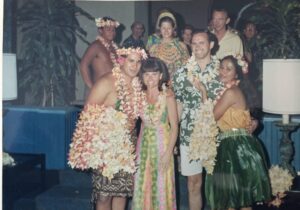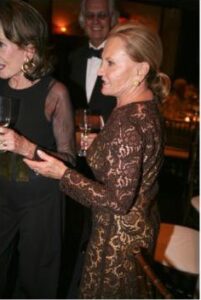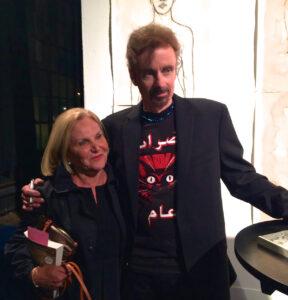
CONVERSATION WITH CONNIE STRYCKER, influencer and archetype for Mad Men?
“Oh my God, I thought, that’s my life and it’s on TV and I’m watching my life in my house in my clothes. I’m watching and I say, I had a dress just like that, I wore my hair just like that…”
Connie Strycker interview
by J.Macon King
MillValleyLit: Connie, what was your and your husband Walter’s reaction when you first saw Mad Men?
Connie: The night it premiered we happened across it on TV. We had no idea what to expect. It was so relatable, as we were in New York and Connecticut during that time depicted and Walter was a businessman in Manhattan. We said, this is really good. The credits came up and we saw Associate Producer: Blake McCormick, who we watched grow up. We’ve known Blake his whole life. We know his whole family. We immediately called Blake and raved about the show. He said he’d send us the season on tape, which was really cute of him. And he did. So we were able to watch the season in advance.
MillValleyLit: How did you and your husband Walter, know Blake McCormick and his family so well?
Connie: Walter and Blake’s father, Harold, both worked together in New York and were very good friends. They were not in advertising like Mad Men, but in marketing and sales at IBM. Walter had the Exxon account, getting them computerized. IBM head office was near Madison Avenue, so the men did know a lot of people in advertising. Men like those “mad men.” Harold and Walter would often ride on the train together to and from Grand Central Station. Our family lived in Greenwich, Connecticut and Harold McCormick and his family lived in Chappaqua, which was maybe twenty minutes away.
They had six kids, six kids. We had two. Our oldest daughter, “my Karen,” and “their Karen,” as we called them, my Karen was maybe a year older. Mark was the same age as “my Karen.” Tara was the same age as Jana. Gregory was in there someplace. Blake was “the baby” of the family. (Editor’s note: Born in 1964.)
MillValleyLit: So, your families were that close?
Connie: Yes. We were always at their house or we were at their house. We had family dinners together. We had Thanksgiving with them. They were our “family.”
The McCormicks lived on Frog Rock Road, (chuckles) of all places. They lived in an old gorgeous house, huge, and right on the Chappaqua country club. We all were members of the club, called The Whippoorwill Club. The kids swam together.
MillValleyLit: So, you were there in that place and time period, the sixties, and some fifty years later you watch the show. Your period there is so perfectly replicated. That must have been a real blast from the past.
Connie: Oh my God, I thought, that’s my life and it’s on TV and I’m watching my life in my house in my clothes. I’m watching and I say, I had a dress just like that, I wore my hair just like that, that’s how we wives went into New York to meet for lunch. The ambiance was so right on. The show was so realistic, I almost felt I was there. Mad Men was so Greenwich, Connecticut, so Chappaqua. It was spot-on. As we watched more of the episodes, it became even more so. There was not one thing that absolutely was not the way it was. After a few episodes I said, there has to be something that didn’t represent the period. And it never happened. It was like watching our old life.
I kept repeating to Walter, that’s our life! That Mad Men really represents that time, our time. And the more we watched the more it hit closer to home. Literally. The Draper house? I realized, the Draper home, that’s my house, in Greenwich! I kept thinking, oh my God, that’s my home!
It wasn’t my house exactly, but the Draper home was very much like my home; the kitchen was painted the same color, the cabinets, their phone on the wall in the kitchen… I mean I’m not sure they deliberately tried to make it like my home; maybe other homes there were like that, but…whatever. The McCormick house did not look like our house.
MillValleyLit: How surreal. The writing on the show was tremendous, I should say that, since this is a literary magazine. Especially the characterizations, and the long-term secrets of Don Draper which helped carry the show through seven seasons. Tell us what you thought about the Don Draper character.
Connie: I was mesmerized because Draper was Walter! Just in a different business. And a lot of his bosses were like Draper’s boss, Roger, at Sterling Cooper. But without the drinking at IBM. The IBM founder and his son Thomas J. Watson, Jr., who also lived in Greenwich, by the way, did not tolerate drinking. Company policy. Madison Avenue— absolutely drinking, bosses would come in and pour a drink, just like Roger Sterling. Other businesses, probably.
It was the time that the “masters of the universe” could go out—do anything they wanted. Yet, IBM was a very circumspect company. Except sexually. My best friend, Gloria, came to visit me from California. Beautiful lady, long blonde hair, she was so gorgeous. And married. She visited us and I told I can’t go into the city, but you go see the sites, Staten Island, go up the Empire State Building, then meet Walter at his office and take the train back with him. She’s goes into Walter’s office, and his co-workers keep calling him. Who is she? We don’t care. Hire her. Hire her immediately!
MillValleyLit: (laughs) Sounds like Joan walking into an office. With her celebrated pointy top, it took her fifteen seconds to fully enter a room.
Speaking of “characters,” John Slattery’s portrayal of carefree and unpredictable Roger Sterling added a lot of spark and humor—a perfect counterpoint to Draper’s seriousness.
Connie: Yes. I mean it, Walter was so Draper, during that time. He was the man of the universe, too. It is hard for you to see that now, now that Walter is older—he’s 94. He was extremely gorgeous and sexy and had a persona like Draper.
MillValleyLit: Very confident.
Connie: Very confident. Yes. A lot of the stories that came out about Walter, anything written about him, and several in the Times, like when he was DeLorean’s CFO and friend. Journalists kept wanting to make Walter a womanizer like John DeLorean, but he wasn’t. It all came out that Walter had a “Princeton style.” Like there’s a “Yale style.” A way of being. And Walter did not even to go to Princeton, Walter went to Cal! (Both laugh.)
(Editor’s note: Walter Strycker was interviewed in MillValleyLit’s Fall 2013 issue about his working with the DeLorean automobile group and more.)
MillValleyLit: I have to admit when I first met Walter, I was a little intimidated by him. Tall and Clint-Eastwood-looking. Matter of fact and dry until you get to know him. Then he smiles and his warmth comes out, and you think, “Yes, sir, whatever you want.”
Connie: Yes, everyone was intimidated. Just like people were intimidated by Don Draper—his manner and professionalism. And that was so stunning, “seeing” young Walter on TV. It was amazing to watch “ourselves” on TV right in front of us. I don’t think people realize, but we really did live that life.
MillValleyLit: That’s remarkable. What else caught your attention?
Connie: There was not one thing out of place or time. It was the way people dressed. I swear to God, Betty Draper wore the same clothes that I wore! The dresses, the outfits. I was so overwhelmed watching—it was so perfect: the way people talked, the way they got away with saying things that they said. I think everybody was having affairs. It was always so much whispered at the office. So much drinking. But, Walter never really drank. But all the drinking, that’s the way it was. They depicted people in a working environment that was so true. The way they work at the firm—they don’t talk about things.
Draper was the epitome of the man of the universe. I mean he really was. It’s just not that way now. Weiner really hit more than anything right than I’ve ever seen portrayed in an era. Brilliant.
MillValleyLit: Connie, you had a major office background, also.
Connie: Yes. I started working for NBC in San Francisco as a go-fer. The offices were on Taylor Street in San Francisco. I also worked in the mail room and typeset for the news department. I took over the switchboard for NBC and ABC, when ABC moved upstairs. This was before TV! It was in 1952, and a sought-after job— crazy! I made $90.00 every two weeks— nine-to-five. Oh, and I was in charge of the teletype— news came in from everywhere. It was all very fast-paced and exciting. I had a great time. I met so many interesting people—even Eleanor Roosevelt when she came for a broadcast at ABC.
MillValleyLit: Really? Eleanor was very, very popular. That all was quite the experience. You were almost like the Joan of the office.
Connie: Not quite as glamorous, but OK…
MillValleyLit: Walter and Harold McCormick eventually started their own business, right?
Connie: Walter wanted to move back to the Bay Area, back home to Orinda. Walter and Blake’s father, Harold, were going to form a business. Harold’s family didn’t seem to mind moving. Both quit IBM and we all settled in Orinda. Walter and Harold went into business together, formed the Decimus Corporation in San Francisco.
Decimus was a data processing company, which was the first one bank holding company. It was the first in the area. They had data centers for when the banks finish their work at the end of the day. We eventually had to sue the Bank of America. Did Walter ever tell you that?
MillValleyLit: No, but he has so many stories. In my interview with Walter, I mostly got his DeLorean and Belfast days, your former running of Marie Callender’s, and, of course, all of his crazy airplane, helicopter and car crashes. Perry, has heard a lot more of the others.
(Editor’s note: MillValleyLit Editor Perry King has been a personal trainer to Walter Strycker for fifteen years.)
Connie: Walter has done so much; some people must think he makes stories up. It embarrasses me because that people might. But he’s done so much. Did you ever think he makes up the stories?
MillValleyLit: Oh, no. He doesn’t have to.
Was there was a particular episode that you said, oh my, that’s my house and my clothes?
Connie: Well, some little scenes in the first two episodes, but probably the third one, his daughter’s birthday disaster episode. It’s just the way our house was. It made me feel like I was back in my house. But it is the way we lived. For us personally, minus the heavy drinking and the affairs. We did host dinner parties, cocktail parties for Walter’s co-workers and our friends, and there was plenty of liquor flowing then.
What I’ve told Blake about retro shows, is that they try to depict an era, but if you have lived it, you can’t believe them most of the time. Mad Men didn’t miss. I kept telling people, “You have to watch this show. There’s nothing like it.” I could relate so well, but then I thought, maybe nobody here in Marin County could.
MillValleyLit: Well, the series is so very East Coast, with the Madison Avenue, old Wall Street flavor. I know what you mean, as the East Coast upper classes tried to hold on to, say English tradition— the correct place settings, the right dress, the composure. Even as the times were changing in the sixties to Bohemians and then counter-culture—anti-advertising and consumerism, which was brought out in the show. The West Coast has never been as concerned about tradition and appearances. However, the productions were so well done and so intelligent and creative, the appeal was universal.
MillValleyLit: Let’s hear about Blake and the other McCormick children. Did Blake show any young creative streak?
Connie: There were so many kids between our families, I couldn’t say. Blake did grow up in an unusual home. I won’t elaborate. As I’ve mentioned, Blake was the youngest of six children, “the baby.” Blake was really bright. Well, we always knew Blake was a little different. And it turned out Blake is gay.
MillValleyLit: That’s not a secret, right? I don’t want to out the man, if that’s even a thing anymore.
Connie: That’s fairly common knowledge. And Blake went to Vassar.
MillValleyLit: Vassar was historically a girls’ school, right?
Connie: Yes. The college first opened to boys right just about at the time, 1982. He wasn’t in the inaugural class of coeds, I don’t think, but maybe the second.
Blake’s in Italy now, working on something. Harold has passed but the other McCormick kids are around. Some of Blake’s sisters live in Alabama. Tara is in Alabama—she’s a doctor, she married a doctor. Stacy lives in London. Our older daughter, Karen, is still in touch with Karen and maybe Tara.
MillValleyLit: Jon Hamm has a new movie out now, streaming, called Confess, Fletch, a lightweight comedy, which, even after I lowered my expectations, I couldn’t finish. Hamm is no Chevy Chase, and obviously miscast. I always wondered, why didn’t they cast Hamm as James Bond?
Connie: Yes, why didn’t they?
MillValleyLit: Or as Cary Grant in a Hitchcock remake? Like To Catch a Thief.
Connie: I would love that. Hollywood! Who knows what happened.
MillValleyLit: By the third season of Mad Men, Blake had been promoted to producer. I’m not sure how Blake became involved with Mad Men creator Matthew Wiener. Do you?
Connie: No. After Vassar, Blake went to L.A. He wanted to be in that industry. I spoke to him several times there. It was a struggle. Blake probably met Matt there.
MillValleyLit: Well, they worked together again on Amazon’s series, The Romanoffs, so that’s a good sign of long-term mutual respect. And John Slattery had a role in that series, too.
After Matthew Weiner’s tremendous work on Sopranos, Weiner tried to interest HBO in Mad Men and they turned him down. Then Showtime turned him down. Then it became a huge hit for AMC, of all places.
Connie: Yes, he had a hell of a time selling the show.
MillValleyLit: (in gruff voice) “Ad men in suits in a period drama? No, no. Boring. Who would watch that?” (Both laugh.) Kind of like the producer who turned down the Beatles, right? The HBO CEO later admitted that his biggest regret was passing on the show.
END
McCormick and the production team were nominated for the 2011 PGA Award for Television Producer of the Year Award in Episodic for their work on the fourth season. Mad Men ran for seven seasons and received sixteen Emmys out of 116 nominations. Hamm was nominated for best actor eight times, winning once. It is praised as one of the greatest television series of all time.
McCormick’s later TV work includes TV: True Detective S2, The Romanoffs, Swingtown, The Last Tycoon.
Read the essay, Mad Men Revisited.
 The diminutive dynamo Connie Strycker, has appeared in Delorean: Back from the Future (2021 TV Special). She is known to be a good negotiator, mediator and a shrewd Mahjong player.
The diminutive dynamo Connie Strycker, has appeared in Delorean: Back from the Future (2021 TV Special). She is known to be a good negotiator, mediator and a shrewd Mahjong player.

